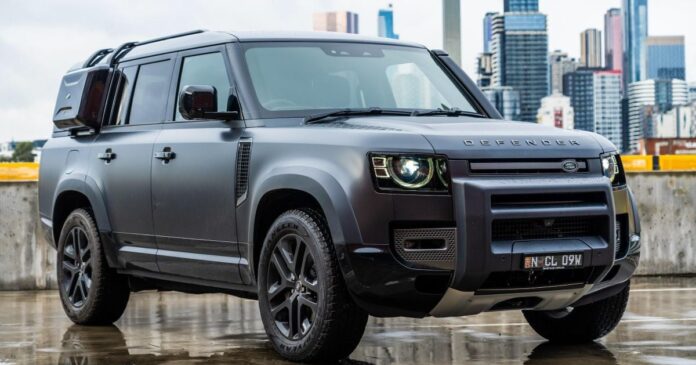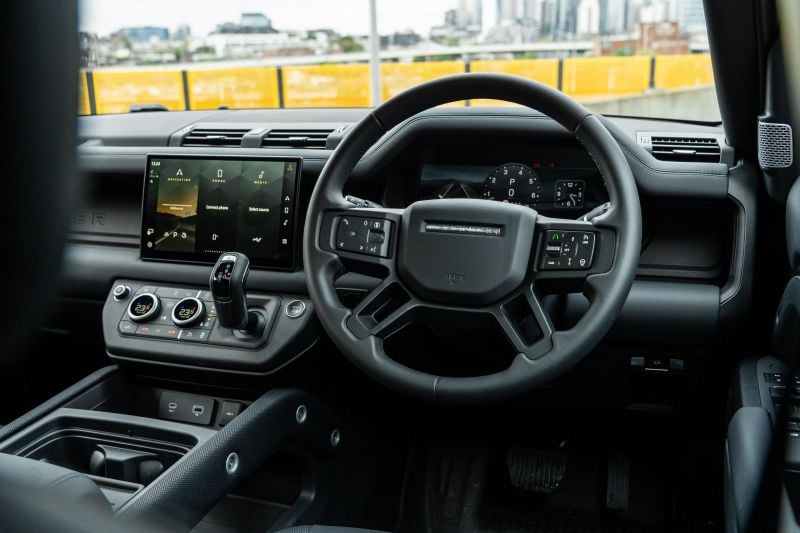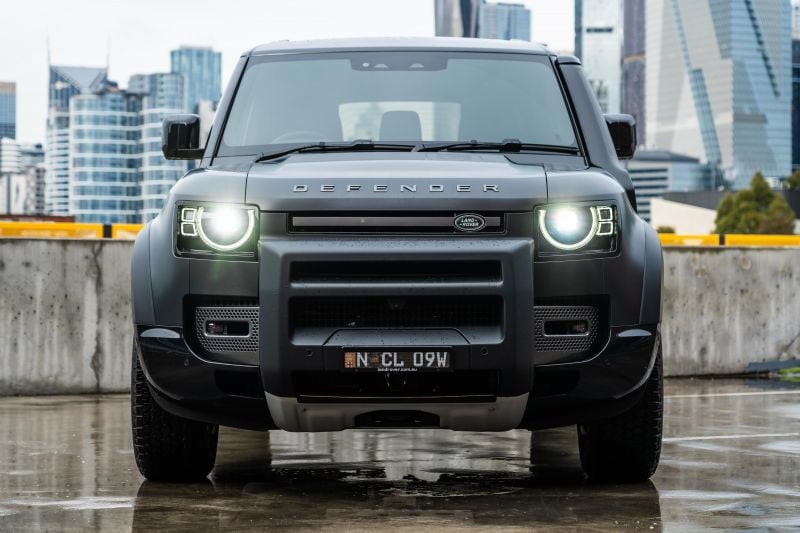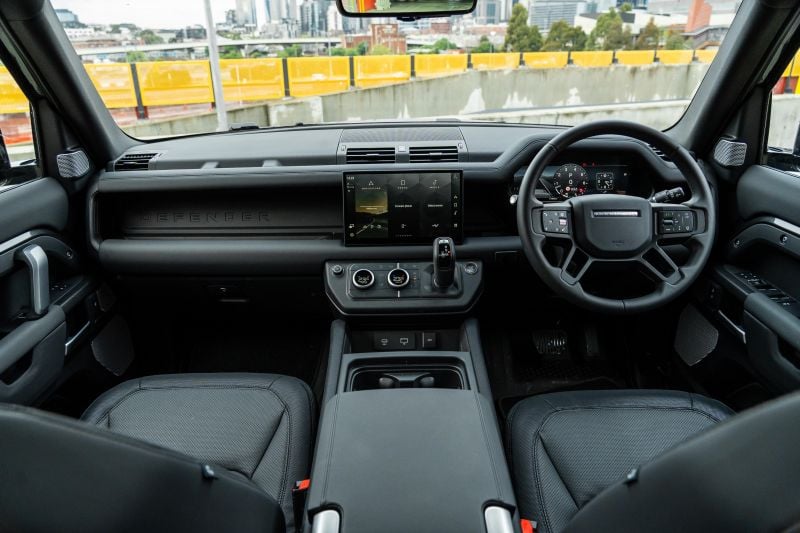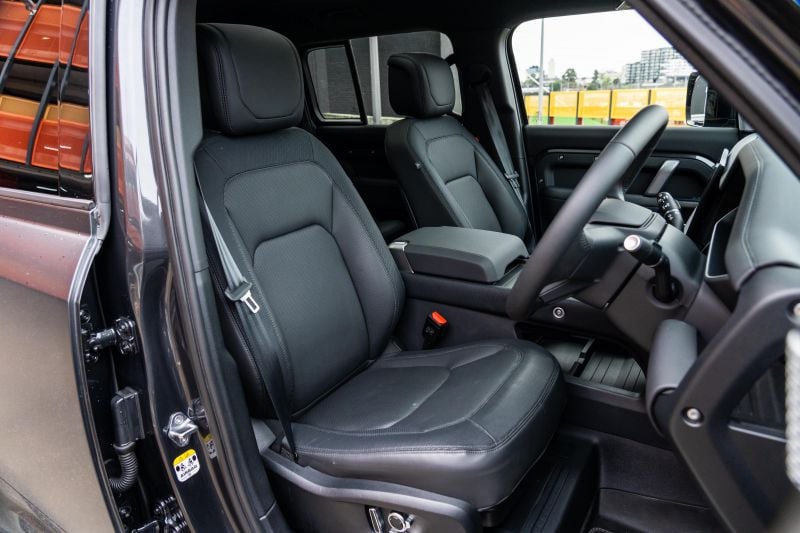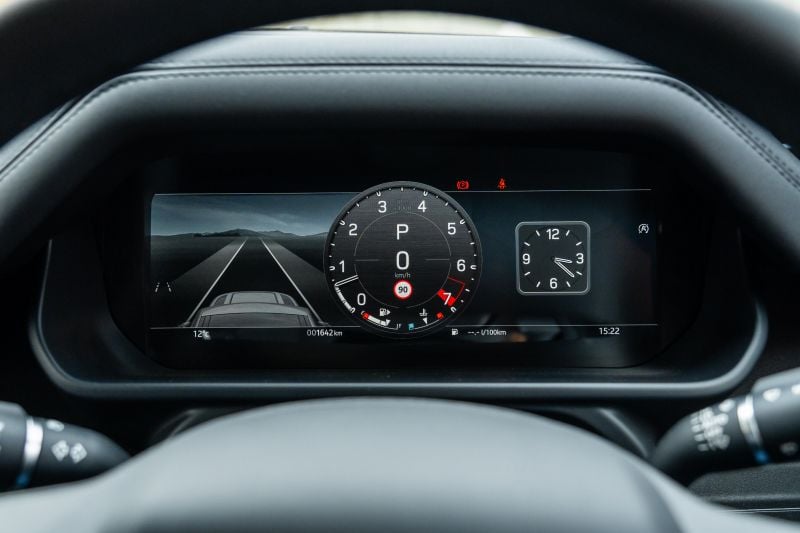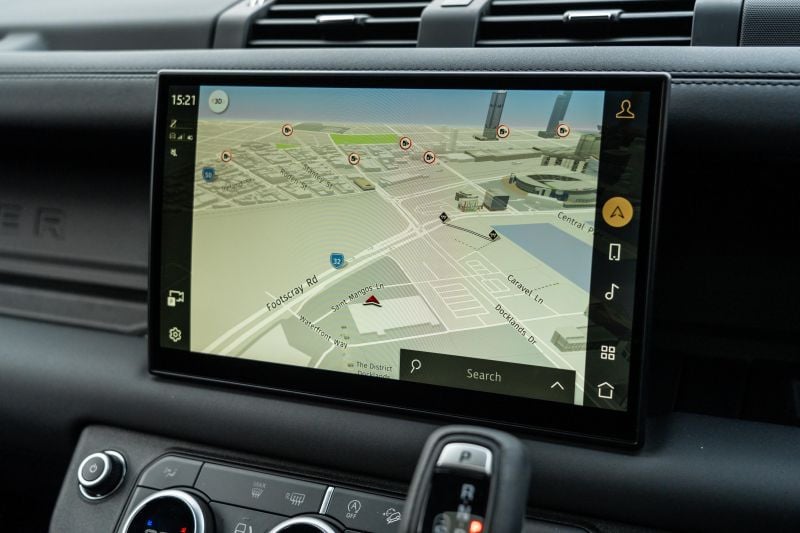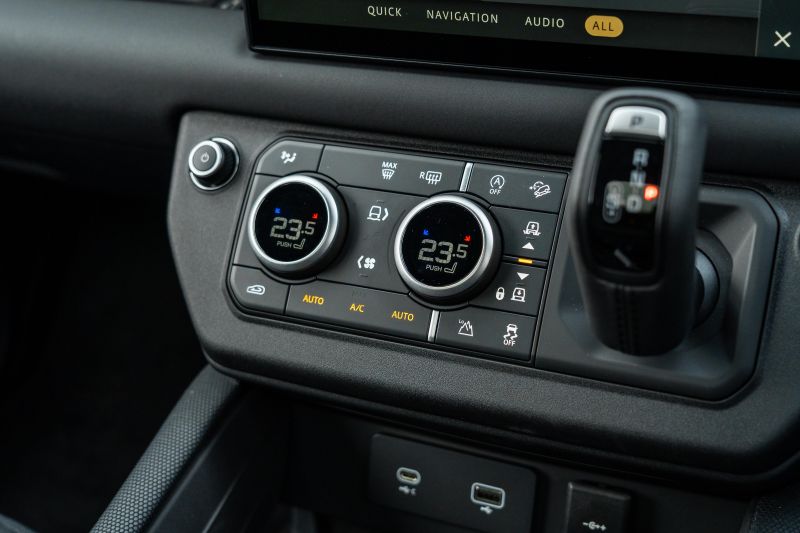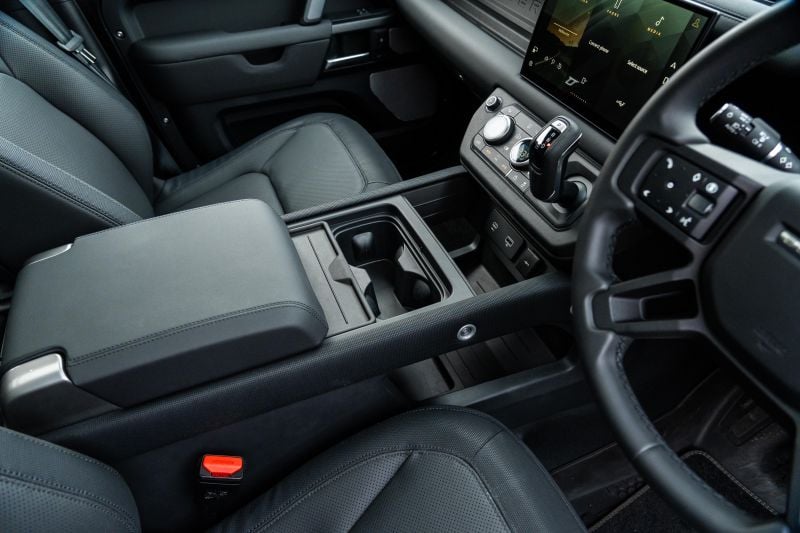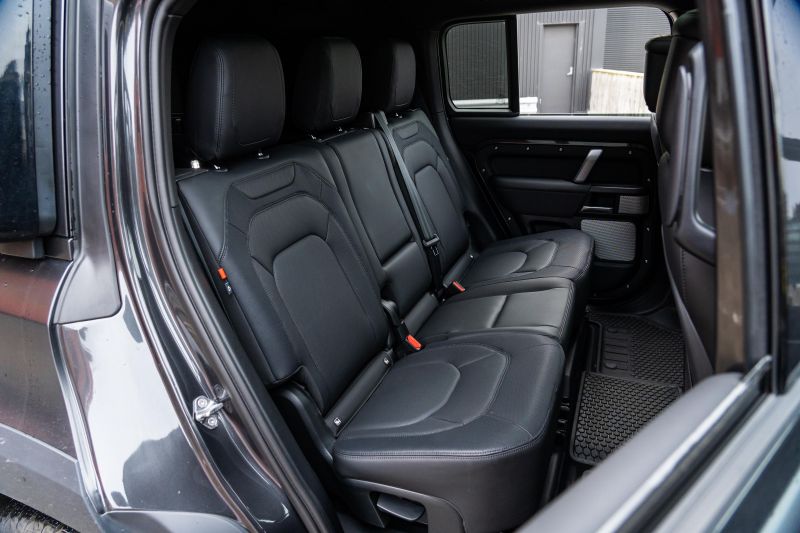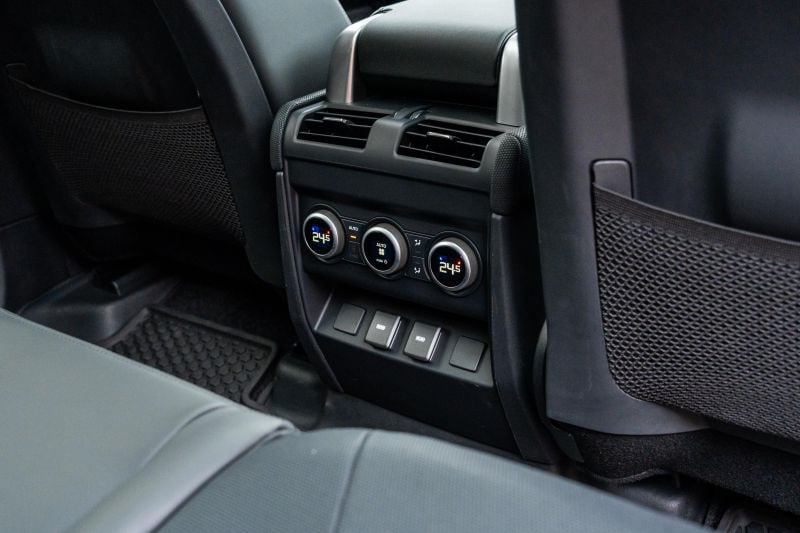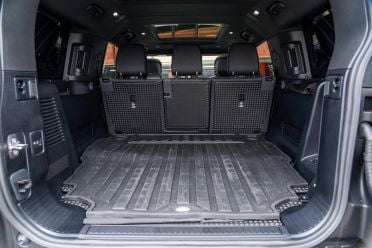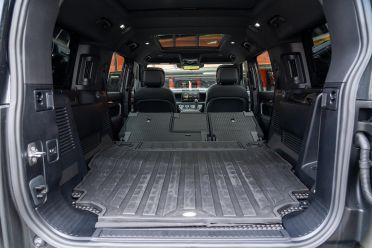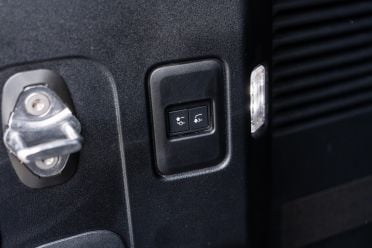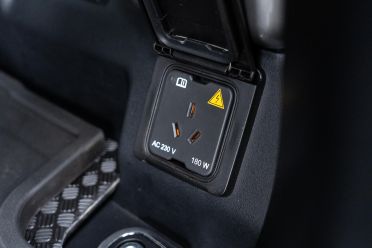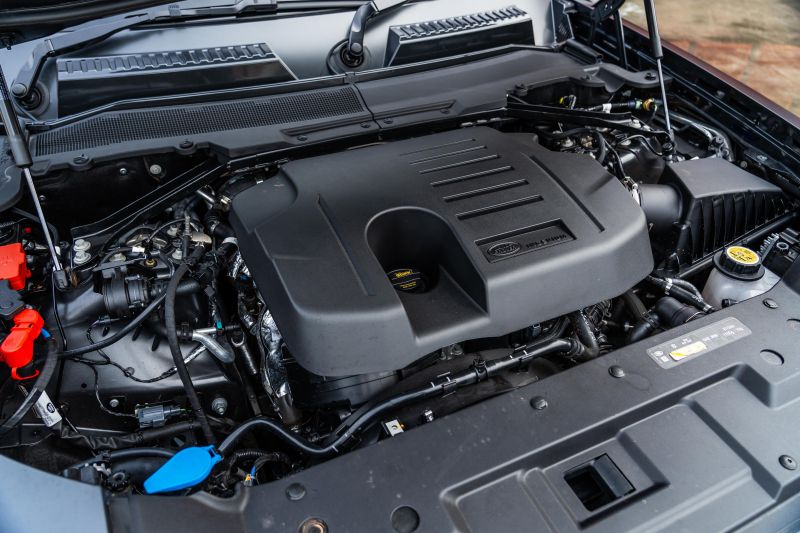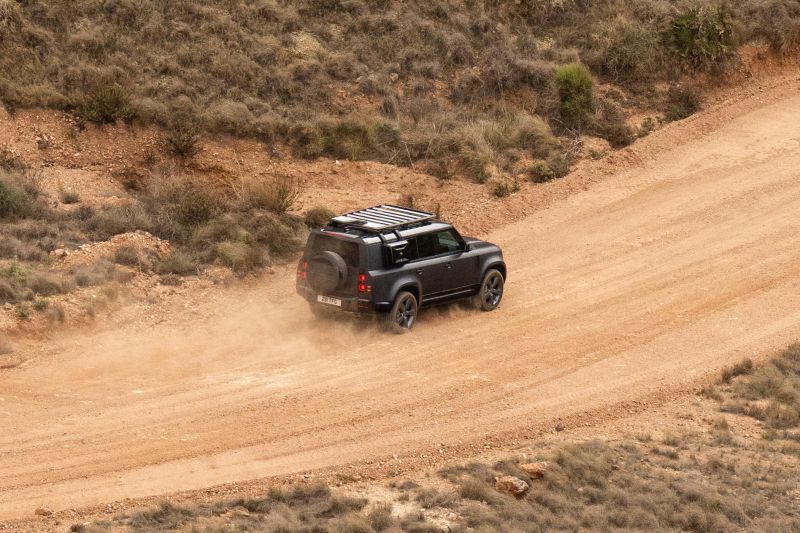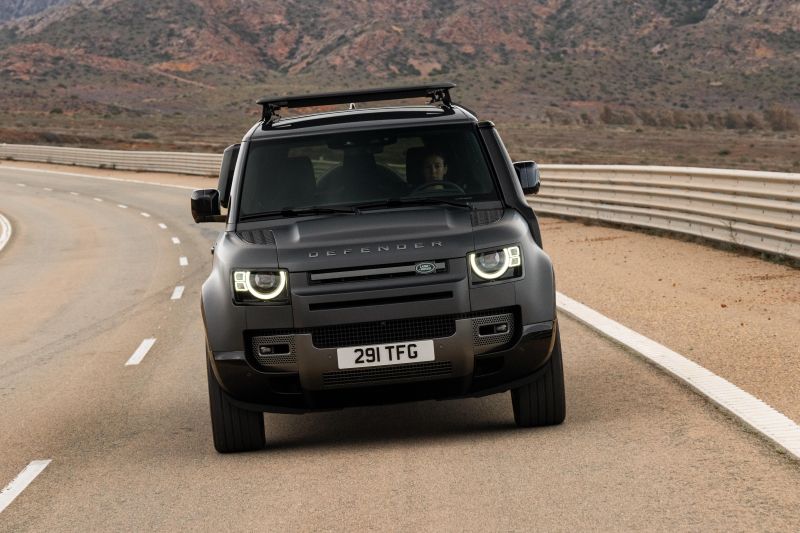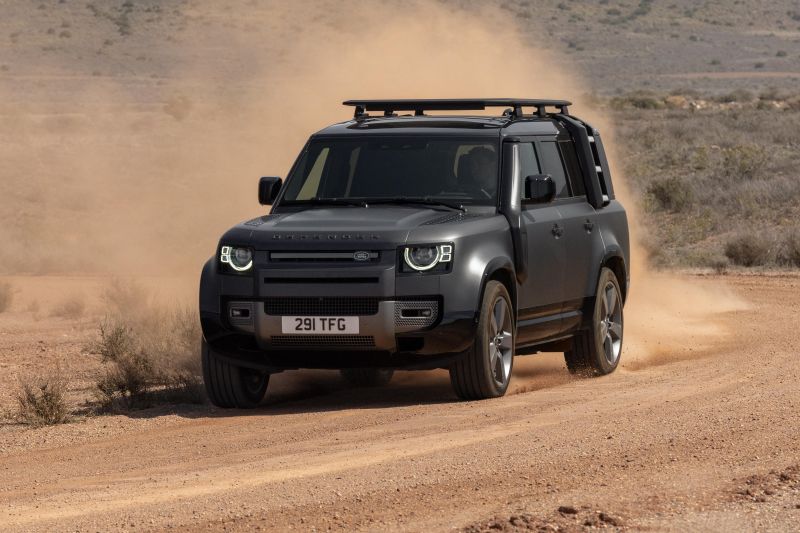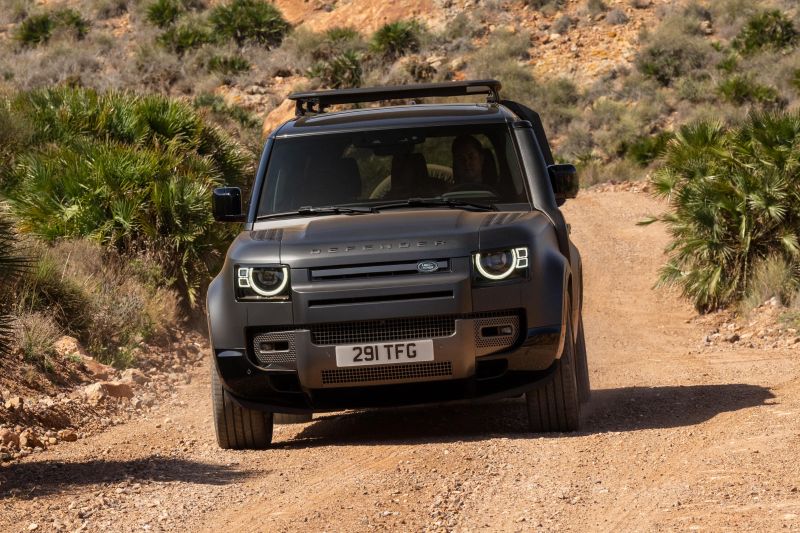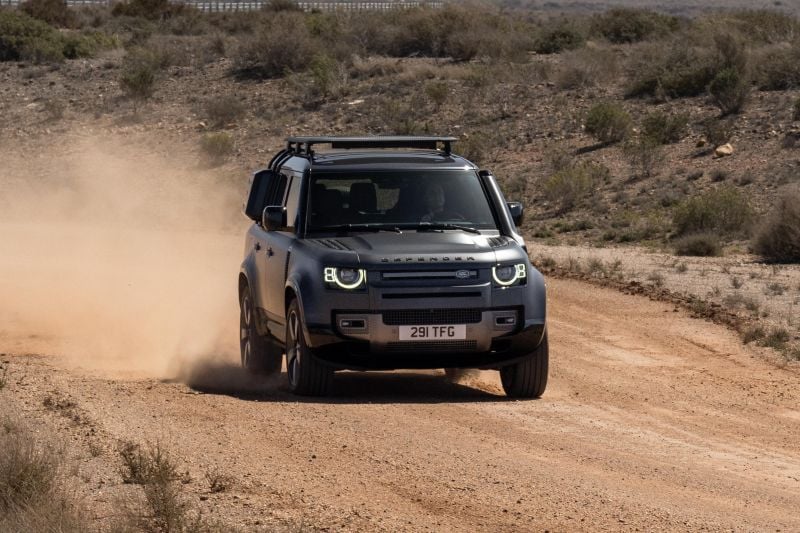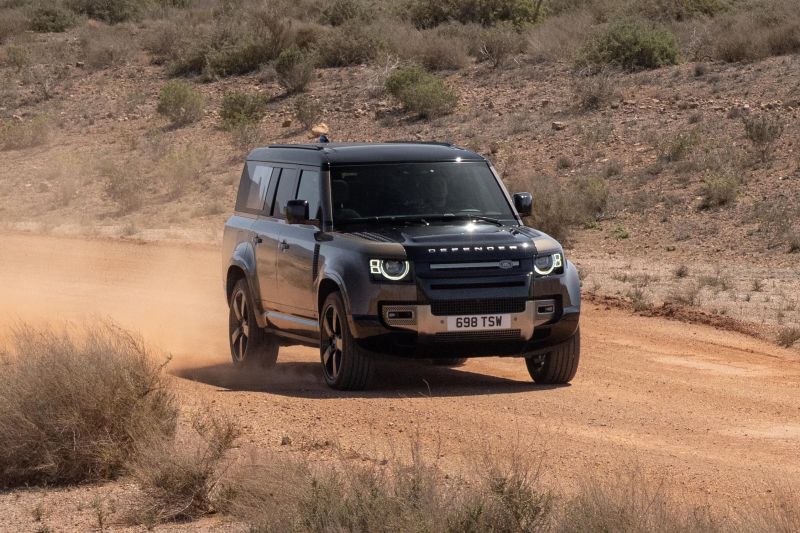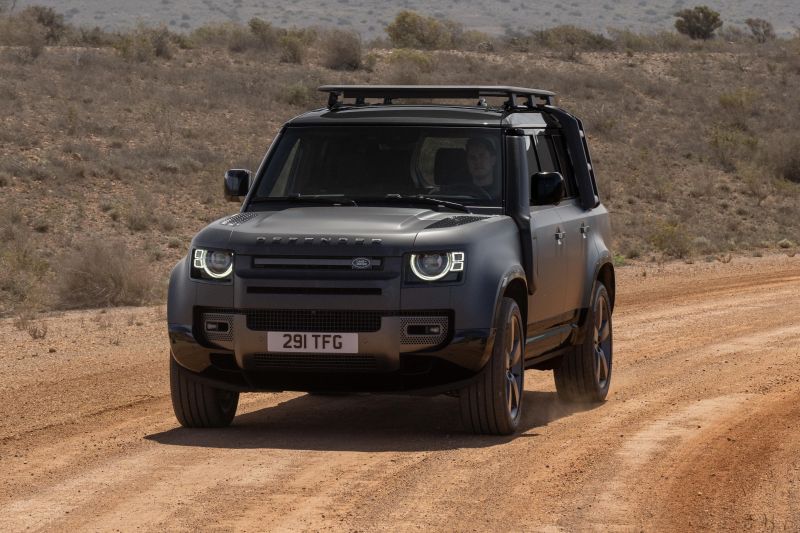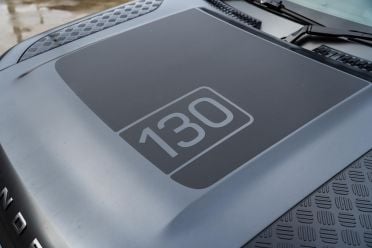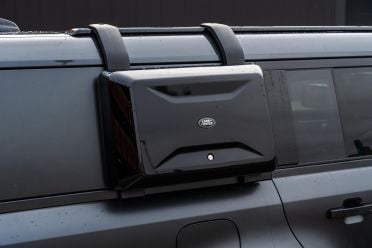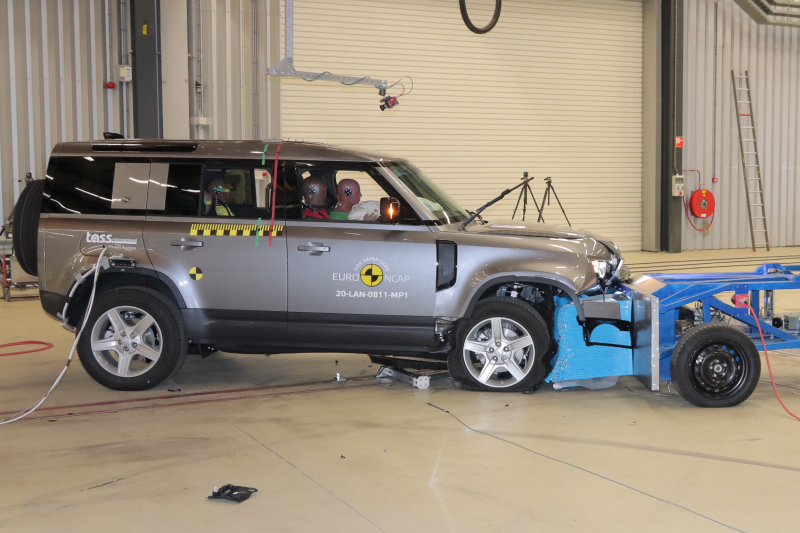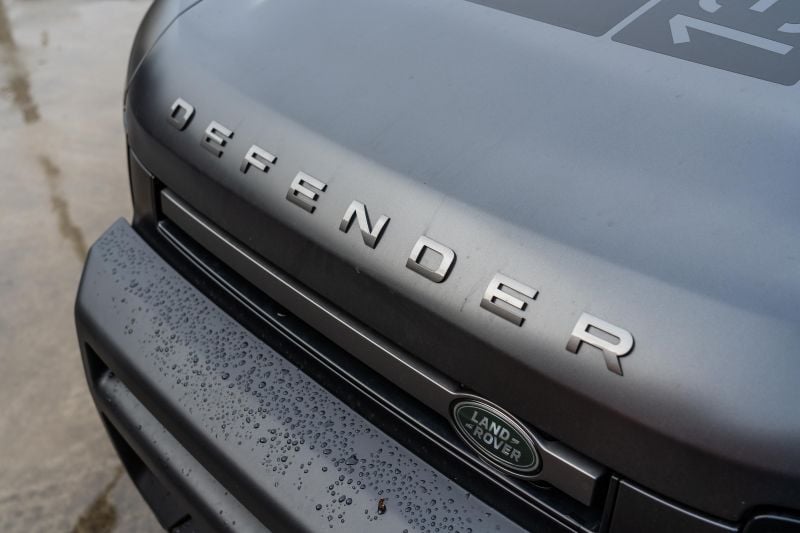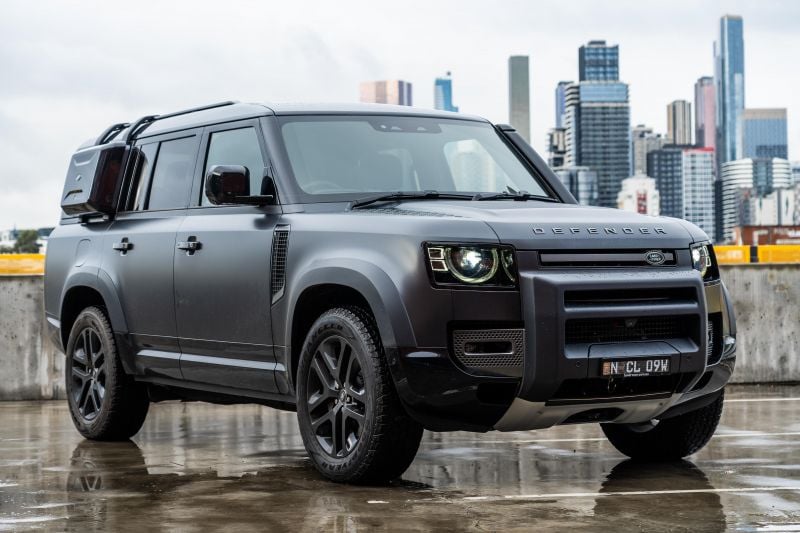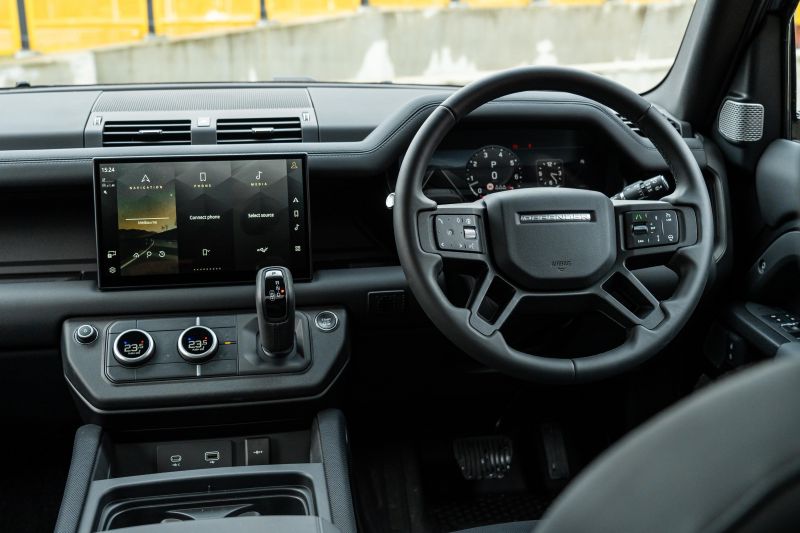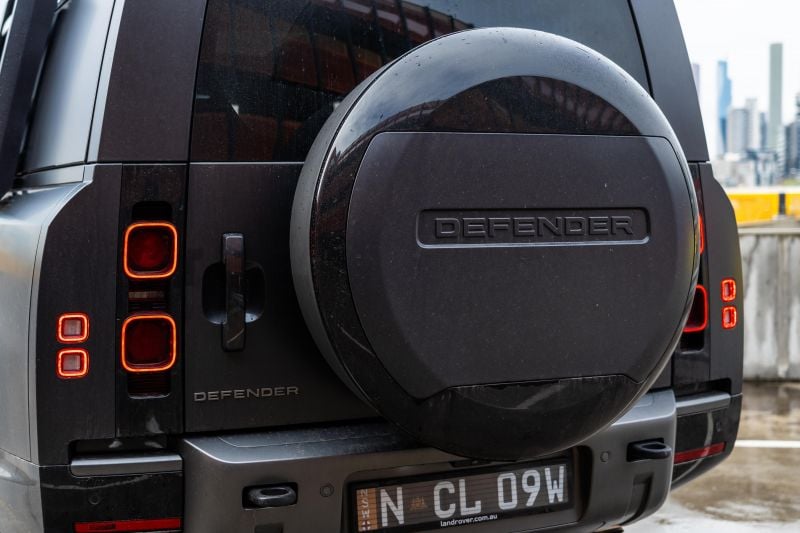Living large and in charge – that’s what driving the 2025 Land Rover Defender 130 feels like.
This long-bodied version of the luxurious off-roader first splashed onto the Australian market in late 2023, over a year after its rear-heavy silhouette divided people at its reveal in mid-2022, with some wags jokingly nicknaming the car ‘Hugh Jarse’.
The Defender 130 finally gives prospective Defender buyers a larger cargo area and a more spacious third row of seats, if applicable – more on that later.
For the 2025 model year (MY25), JLR (Jaguar Land Rover) has given the Defender a more powerful diesel engine and other various specification changes. Some Defender 130 variants have also received minor price cuts.
On test here is the penultimate variant in the Defender 130 lineup, the offroad-focussed Outbound, which is only offered with an inline-six mild-hybrid petrol engine designated P400.
How does this 5.4-metre behemoth hold up in the hustle and bustle? Read along to find out.
How does the Land Rover Defender compare?
View a detailed breakdown of the Land Rover Defender against similarly sized vehicles.

Land Rover
Defender
Pricing for the 2025 Defender 130 has received yet another minor cut. It’s worth calling out our tester was an MY24 vehicle.
MY24 Defender 130 pricing:
| Model | Price before on-road costs |
|---|---|
| 2024 Land Rover Defender 130 D300 X-Dynamic SE | $126,670 |
| 2024 Land Rover Defender 130 P400 X-Dynamic SE | $134,620 |
| 2024 Land Rover Defender 130 P400 Outbound | $136,870 |
| 2024 Land Rover Defender 130 P500 V8 | $240,270 |
MY25 Defender 130 pricing:
| Model | Price before on-road costs |
|---|---|
| 2025 Land Rover Defender 130 D350 X-Dynamic SE | $129,365 |
| 2025 Land Rover Defender 130 P400 X-Dynamic SE | $133,471 |
| 2025 Land Rover Defender 130 P400 Outbound | $135,562 |
| 2025 Land Rover Defender 130 P500 V8 | $216,197 |
Our MY24 tester was fitted with around $35,000 of optional extras and accessories, bringing the total asking price to $171,920 before on-roads.
To see how the Defender lines up against the competition, check out our comparison tool.
The Defender 130 P400 Unbound has a menacing presence. At almost 5.4 metres long and nearly 2.0 metres wide, it fills and sometimes spills into the next parking space.
As standard, this long-bodied variant gets electronic air suspension that allows it to vary its height depending on the drive mode, or by pressing dedicated buttons on the dash. Thankfully, this means you can lower the car down to make it easier to get in and out of.
On the flip side, when parked in its off-road suspension setting it’s a huge climb into the cabin. There were a few occasions when I basically had to jump out as I couldn’t touch the ground.
It took me a while to find a proper grab handle to help me get in, but I eventually found one integrated seamlessly into the dashboard, and not on the A-pillar. You definitely need to use it in this car as there are no side steps as standard.
Behind the wheel, you definitely feel like you’re above everyone on the road, almost like you’re in a truck. This gives you the feeling of control, and makes for great visibility out the front. Turn around and face the other way, however, and you’ll realise just how large the cabin is, plus how many blind spots there are.
The Defender 130 P400 Outbound comes exclusively with inoffensive-looking black faux leather upholstery as standard. The front seats in particular are extremely comfortable and have almost limitless amounts of electric adjustment.
My favourite adjustable parts of the front seats include the side bolsters and thigh support. These allow taller people to feel at ease and well supported for longer drives.
Our tester came with both heated and ventilated front seats – the former was handy on chilly Melbourne mornings. Something I noted is the heated seats work by pumping hot air through the trim perforations, instead of using a heated coil like in many other vehicles.
When the heated front seats are activated they get really warm, but once they reach a certain temperature they start blowing cooler air. It’s almost like an overheat protect feature, which is nice to have.
Ahead of the driver is a rather large steering wheel, which is befitting of a vehicle this large and further reinforces the fact the Defender 130 is a big bus.
The leather wrapping on the steering wheel feels delicious in hand. Our tester’s wheel was also heated, which got the rim warm enough but there were some hot patches.
All the buttons on the steering wheel are large and tactile, but I found some took a very exaggerated click to work properly. I like how the function of these buttons can change depending on what you’re doing with the digital instrument cluster.
Speaking of which, there’s a 12.3-inch digital instrument cluster as standard, which looks crisp and clear. It also offers plenty of configurability so you can set it up to display the exact information you actually want to see.
One of my favourite features is that the digital instrument cluster can display a navigation map and pull the information from Apple Maps when connected to Apple CarPlay. Unfortunately, it doesn’t work with Google Maps though.
Disappointingly, there’s no head-up display fitted as standard on the Defender 130 P400 Outbound. Instead, it’s available as an optional extra, which is slightly baffling given the circa-$150k drive-away asking price of this vehicle before options.
Beside the digital instrument cluster is a large curved 11.4-inch touchscreen infotainment system powered by JLR’s Pivi Pro software. It’s a stunning unit that’s bright and has crisp resolution.
I found the touchscreen to be very responsive to touch inputs, so iPad users will feel right at home when interacting with it. As a newbie to the Pivi Pro system, however, I felt bamboozled until I got the chance to properly dive into all the menus.
I initially had problems finding the audio settings in the infotainment system. Turns out there’s a separate tab for this, which in all fairness is clearly marked, but I assumed it’d be easier to find. It also took me a bit to learn the auto-hold function is toggled on the touchscreen.
As expected, the Defender 130 offers both wired and wireless connectivity for both Apple CarPlay and Android Auto. With my iPhone 15 Pro Max connected wirelessly, the connection was generally okay but known interference points and toll booths caused dropouts.
When this happened it would take a bit of time to reconnect, which is frustrating if you’re navigating somewhere, or you’re midway through belting out the chorus of your favourite song.
If you’re stuck without phone signal and still need to navigate, thankfully there’s in-built satellite navigation, which is super easy to use. There’s also an embedded SIM card in the car, which allows for live traffic data.
Around the Defender’s cabin there are plenty of tactile physical buttons and dials under the touchscreen, which makes sense in a vehicle that’s intended to be taken off-road.
The climate control dials in particular stand out because they’re chunky enough that they could be used with gloves on. The dials also have a nifty feature that, when pressed, allow you to then change the seat heating/ventilation.
Another piece of logical interior design includes the volume dial actually being on the passenger side. Many vehicles have these closer to the driver, which doesn’t make sense as passengers need to reach over the dash to use it.
This is even more helpful as the Defender has a large and expansive dash. It’s a little disappointing the Outbound variant only comes with black-on-black finishes, so it’s hard to make out some of the cool interior details in low light situations. Thankfully, there’s a large panoramic glass sunroof that does make things airier in the cabin.
Although the Defender’s cabin definitely has rugged touches, including the exposed bolt heads and hard accent panel with Defender script, all the places you touch are luxurious and premium-feeling.
Up front, you’re spoilt for choice in regard to storage spaces. There are two cupholders with rubber teeth, a large uncovered section under the centre tunnel, an optional refrigerator where the centre console box is, plus plenty of charging ports, and a wireless charger that cooked my phone rather than actually charging it.
A lot of the storage spaces are rubberised, meaning items won’t slide around when the going gets tough.
Hopping into the second row of the Defender 130 is just as much of a leap as it is up front. Thankfully, there are more obvious grab handles that make this process a lot easier.
It’s worth noting all the doors on this car are really heavy, especially when parked on an incline. This means smaller kidlets may struggle to open and close the doors themselves.
Once you’re in the second row it’s obvious how palatial this car is. At a leggy 182cm, I had oodles of leg room, head room, shoulder room and foot space behind my driving position. This is helped by the second row both sliding and reclining.
Three adults can easily fit across the second-row bench with space to spare. It really is the place to be for long road trips since you can stretch out and relax.
Like the front two seats, all the second-row seats are comfortable, soft and squishy. Even the middle seat isn’t awkwardly perched like in some cars, which is a big plus for people wanting to carry passengers.
One downside is our tester doesn’t come standard with heated rear seats, despite its circa-$135k list price. Instead, this feature is also available as an optional extra.
Despite this, there are still plenty of amenities in the second row. These include a third zone of climate control, centre console-mounted air vents, USB ports, and a fold-down armrest with cupholders.
While the Defender 130 is best known for offering eight seats, our Outbound tester only comes with five seats. Yes, you read that correctly: this 5.4-metre behemoth doesn’t have a third row of seats.
What this means is that cargo space is GINORMOUS. Land Rover claims the defender 130 P400 Outbound offers no less than 1329 litres of luggage capacity with all the seats upright, though this figure is likely measured to the roof.
In order to access this huge boot, you need to open the side-hinged tailgate that has a full-size spare wheel mounted to it. It feels heavy, which means kids will struggle to open it.
Unlike other side-hinged tailgates, the Defender 130’s doesn’t have traditional stops. Instead, the tailgate will lock into position wherever you open it to. This is really handy if you only want to open it a bit.
Another cool boot-related feature is the air suspension control unit that allows you to lower the car down from the rear, making it easier to load items in.
Looking at the boot space, you can see where the rearmost row of seats is positioned in other eight-seat Defender 130 variants. An example is the C-pillar-mounted air vents that would typically be for third-row occupants. There’s also a slight incline in the boot floor where the third row of seats would be.
Amenities in the boot includes a fair amount of lighting, a 230V domestic power point, tie-down points, and cargo hooks.
| Dimensions | Defender 130 P400 Unbound |
|---|---|
| Length | 5377mm |
| Width | 1996mm |
| Height | 1970mm |
| Wheelbase | 3022mm |
| Cargo capacity | 1329L (5-seat) 2615L (2-seat) |
To see how the Defender lines up against the competition, check out our comparison tool.
The Defender 130 Outbound is only offered with a inline-six mild-hybrid petrol engine designated ‘P400’.
| Specifications | Defender 130 P400 Unbound |
|---|---|
| Engine | 3.0L 6cyl turbo 48V MHEV |
| Power | 294kW @ 5500-6500rpm |
| Torque | 550Nm @ 2000-5000rpm |
| Transmission | 8-speed auto Twin-speed transfer box – high, low range |
| Driven wheels | AWD |
| Weight | 2620kg |
| Fuel economy (claimed) | 9.6L/100km |
| Fuel economy (as tested) | 11.9L/100km (540km mixed driving) |
| Fuel tank capacity | 90 litres |
| Fuel requirement | 95 RON |
| CO2 emissions | 223g/km |
| Emissions standard | Euro 6 |
| Weight | 2620kg |
| Braked tow capacity | 3000kg |
| Gross vehicle mass (GVM) | 3380kg |
| Gross combination mass (GCM) | 6380kg |
To see how the Defender lines up against the competition, check out our comparison tool.
Start the engine and the inline petrol six roars to life with a high idle. It actually sounds pretty good, though it doesn’t linger for long before it settles into a lower and quieter idle.
-
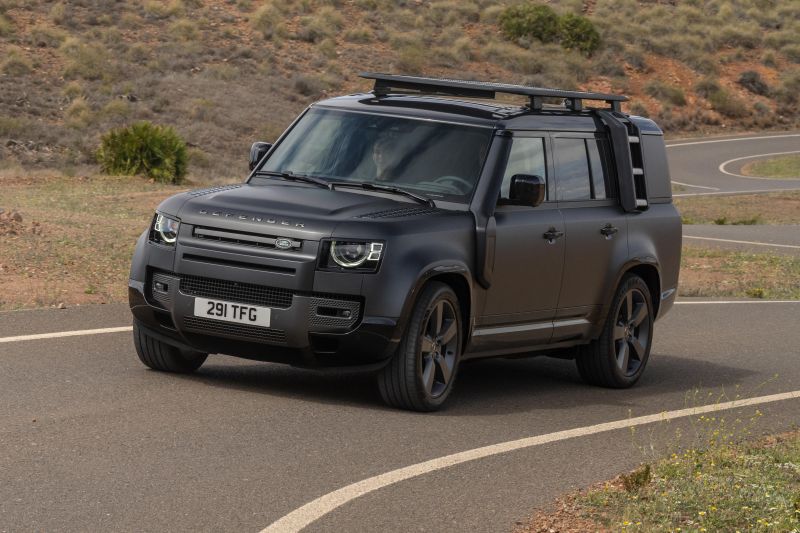
Overseas model shown
After setting off, I immediately noticed the long-travel accelerator feel. It took a fair while to get used to and made the car feel a bit lazy. You need to press the accelerator pretty hard if you want brisk movement.
But this particular petrol-powered Defender is best driven with soft and docile throttle inputs, because when you stamp it there is a slight lag and then a big surge of acceleration.
The P400 engine in our tester drives a lot like a diesel. Peak torque comes on tap from 2000rpm, meaning you can lean on the meaty 550Nm pretty often.
Even around town, the eight-speed automatic torque-converter automatic transmission keeps the revs down to just above idle. This makes low-speed cruising very comfortable and quiet in the cabin.
Despite feeling a little lurchy from a standstill when pushing the Defender 130, there’s plenty of power available. Sport mode, which is activated by pushing the gear selector to the side, makes this more pronounced.
When you floor it, the nose tilts upwards and the rate of acceleration feels incredibly quick for a vehicle this large. It’s very addictive, though you pay for it heavily at the fuel bowser.
Speaking of fuel economy, the P400 inline-six petrol engine has a 48V mild-hybrid system that comprises a belt-driven generator for the engine’s idle stop/start system. The engine switches off seamlessly once you come to a stop, and then switches back on imperceptibly when you release the brake.
It’s a very good system that doesn’t heavily impact the driving experience like some others do. I didn’t feel the urge to switch it off at any point during my week of testing.
At no point can the car operate on electric power alone, unlike some other mild-hybrid powertrains; instead it helps assist acceleration thanks to a so-called electric supercharger (E-SC).
Despite the great idle stop/start system, the Defender 130’s urban fuel consumption is still high. I frequently saw averages hovering around 15L/100km during journeys to and from the office in peak-hour traffic.
During our time with it, or tester’s electronic air suspension virtually ironed out every single pimply urban road in its regular driving mode. If you purposely hit a bump on the passenger side you likely won’t even feel it on the driver’s side.
No, the Defender 130 doesn’t feel like an overly dynamic vehicle. Instead, it feels very comfort-oriented. The body leans around corners, even at lower speeds, but never to a point where it feels like it’s falling over itself.
This does make sense given you’re asking over 2.6 tonnes of high-riding wagon to shift direction at speed. Despite this, the light yet direct steering defies the car’s heft. It makes it a rather manoeuvrable car to drive in the urban slog.
There’s still no escaping how hard this 5.4-metre-long car is to park, however. I embarrassed myself on a number of occasions when I had to perform more than a few what felt like 10-point turns to slot into a tight carpark.
As standard, there are front and rear parking sensors, plus a surround-view camera that actually do help with parking. Something worth keeping in mind, however, is that the reversing camera is mounted under the bumper and not on the spare wheel, meaning you need to account for that when reverse parking.
Another thing you need to account for here is the side-hinging tailgate. The infotainment system actually does a good job of reminding you about this, but it’s still frustrating when the car is already so long.
On the move, there are some very large blind spots. Thanks to the aforementioned tailgate-mounted spare wheel, you can barely see anything behind you. Instead, I was forced to use the optional digital rear-view mirror.
This is the first vehicle in which I actually had to use the digital rear-view mirror, though over the week of testing I grew used to it. I do wish the camera would point down a bit more, because in its lowest position I could barely see cars stopped behind me at the traffic lights.
Things don’t get any better when you look over your shoulder. Both rear three-quarter views of the vehicle are blanked out, which makes reversing out of parking spaces a little terrifying. You’re basically forced to use the surround-view camera system.
Same goes for changing lanes out on the road. There were a couple of occasions when I had to rely on the blind-spot monitoring system, or just stick in my lane to not risk cutting someone off. This amount of guesswork in a vehicle that’s so big and costs so much is nerve-wracking.
Additionally, the puny rectangular mirrors barely show a car in the lane alongside. I wished I could flip them on their sides to see more.
This is a little frustrating as the Defender feels most at home out on the open road. At the legal limit on the freeway, the straight-six petrol engine is revving around 1500rpm and it’s barely noticeable in the cabin.
Naturally, fuel consumption also drops considerably at highway speeds. I frequently saw around 7L/100km, which is great for a vehicle this size.
If you meet a hill or need to do an overtake, the engine will happily drop down a gear, though it’s rarely needed as there’s so much power and torque available.
Something that really surprised me about this car is how quiet and serene the cabin is at high speed, given it’s about as aerodynamic and a brick and it’s fitted with all-terrain tyres. There’s slight wind noise from the side mirrors, but this is common.
The air suspension remains fantastic at higher speeds as it irons out harsh bumps, though over undulations the car can feel a little floaty. This is a common trait for vehicles with air suspension.
On the safety front, the Defender 130’s adaptive cruise control system is okay, but nowhere near standout for the segment. This is a bit of a let-down, especially because the car is so great on the highway.
This system has surges of acceleration when travelling along regular roads, which feels a little awkward. Plus at lower speeds the system can sometimes forget a car is in front of it. In these instances it starts accelerating and then once it realises something is there it slams on the brakes.
That said, the lane-keep assist function isn’t very hands-on, in a good way, and will only intervene when you’re actually leaving your lane.
But it’s worth calling out there’s no lane centring function in this vehicle, and the Defender range also has an annoying speed limit assist system that turns on by default every time you start the car. It chimes when you go over the posted speed limit.
Thankfully, JLR has come up with a great solution that allows you to create a custom profile with only the safety features you want remaining active. You can activate this with the press of a steering wheel button, but you do need to do it every time you drive the car.
Sadly, while the Defender 130 P400 Outbound is intended as an offroad-oriented variant, we didn’t actually get a chance to test it out off the beaten path.
CarExpert founder Paul Maric was very complimentary after off-road testing of a shorter Defender 110 with the same P400 engine. This model also won CarExpert’s 4WD SUV of the year in 2023.
Something to note, however, is that the Defender 130 has the same wheelbase as the 110 but a much longer rear overhang , which limits the departure angle and adds weight at the back-end, so it may not be as agile off-road.
| Off-road dimensions | Defender 130 P400 Outbound |
|---|---|
| Track front and rear | 1706mm (front), 1701mm (rear) |
| Ground clearance | 218.5mm (standard), 293mm (raised) |
| Approach angle | 30.1 degrees (standard), 37.5 degrees (raised) |
| Departure angle | 24.5 degrees (standard), 28.8 degrees (raised) |
| Ramp breakover angle | 22.0 degrees (standard), 27.9 degrees (raised) |
| Wading depth | 900mm |
To see how the Defender lines up against the competition, check out our comparison tool.
The 130 Outbound is the offroad-oriented variant in the Defender lineup. It slots between the D350/P400 X-Dynamic SE and the P500 V8 in the long-bodied lineup.
Defender 130 P400 Outbound highlights:
Exterior
- 20-inch gloss-black wheels
- Full-size spare wheel
- Electronic air suspension
- Adaptive Dynamics
- Terrain Response
- Shadow Atlas exterior highlights
- Body-coloured exterior panel
- Black exposed rear recovery eyes
- LED headlights
- Automatic high-beam
- Front and rear fog lights
- LED tail-lights
- Rain-sensing window wipers
- Heated windscreen
- Heated, electric, power-folding side mirrors
- Auto-dimming driver side mirror
- Puddle lights
Interior
- 12.3-inch digital instrument cluster
- 11.4-inch Pivi Pro touchscreen infotainment system
- Head-up display
- Wireless Apple CarPlay
- DAB radio
- Meridian surround sound system
- Online Pack with data plan
- Wireless charger
- Three-zone climate control
- Cabin Air Purification Plus
- Air Quality Sensor
- Keyless entry
- Push-button start
- Auto-dimming rear-view mirror
- Satin black power coated cross car beam
- Illuminated metal treadplates with Defender script
- Interior ambient lighting
- Power-operated child locks
- Resist upholstery
- 12-way electric front seats with 2-way manual headrests
- Robustec veneer
- Rubber flooring
- Carpet mats with loadspace rubber flooring
- Loadspace rubber mat
- 12V power socket in loadspace
Our MY24 Defender 130 P400 Unbound tester was fitted with around $35,000 worth of optional extras and accessories.
Fitted optional extras:
- Carpathian Grey paint: $1040
- Satin protective film: $7040
- Privacy glass: $1000
- Body-coloured spare wheel cover: $760
- ClearSight interior rear-view mirror: $1446
- Loadspace partition net: $364
- Off-road Pack: $1017
- Electronic active differential with torque vectoring by braking
- Domestic plug socket
- Towing Pack 2: $4085
- Tow hitch receiver
- Advanced tow assist
- Terrain response 2
- All terrain progress control (ATPC)
- Configurable Terrain Response
- Comfort and Convenience Pack: $1665
- Twin front cupholders with cover
- Front centre console refrigerator compartment
Fitted accessories (post registration):
- Remote control electric winch: $6189
- Deployable roof ladder: $1497
- Black exterior side-mounted gear carrier: $1473
- A-Frame protection bar: $1421
- Integrated air compressor: $1416
- Raised air intake: $1179
- Wheel-arch protection: $1128
- Cross bars: $537
- Matte black bonnet decal: $214
The Defender 110 was awarded a five-star ANCAP safety rating (all variants bar those with the V8 engine). Defender 90 and 130 body styles remain unrated.
| Category | Defender 110 |
|---|---|
| Adult occupant protection | 32.51 out of 38 (85 per cent) |
| Child occupant protection | 43.22 out of 49 (88 per cent) |
| Vulnerable road user protection | 38.39 out of 54 (71 per cent) |
| Safety assist | 12.24 out of 16 (76 per cent) |
Standard safety equipment includes:
- Adaptive cruise control
- Autonomous emergency braking (AEB)
- Pedestrian, Cyclist detection
- Junction assist
- Blind-spot monitoring
- Driver attention monitoring
- Lane keep assist
- Parking sensors – front, rear
- Rear cross-traffic alert
- Safe exit alert
- Surround-view cameras
- Traffic sign recognition
Land Rover covers its vehicles with a five-year, unlimited-kilometre warranty in Australia.
| Aftersales Provisions | Defender 130 P400 Outbound |
|---|---|
| Warranty | 5 years, unlimited kilometres |
| Roadside assistance | 5 years |
| Service interval | 1 year or 26,000km |
| Service pricing | $2450 – 5 year service plan |
The Defender 130 isn’t a vehicle you ever really need, but one you really want. It has plenty of kerbside appeal; the number of heads you turn with the raised suspension is off the charts.
The long-bottomed body style does fill a niche perfectly for those who want more cargo-carrying capability, and added space for a third row of seating. But this is where things get a little confusing.
The Defender 130 P400 Outbound tested here is only available with five seats. You can’t even option a third row. This means there’s a cavernous load space behind its rearmost seats, regardless of how far back you slide or recline the second row.
But that also begs the question: what is the point of the 130 body style in this context? On the Defender page of its website, Land Rover Australia markets the 130 as a model with “eight seats for shared exploration”.
Further extending that theme, the Outbound is the off-road variant in the 130 lineup, which doesn’t make much sense when its added rear overhang and extra weight make it less capable off-road than the 90 and 110 body styles.
Adding more fuel to the fire, our tester was fitted with approximately $35,000 worth optional extras, bringing its asking price to over $170,000 plus on-road costs. And there are still more options that could be added.
Surely, optional extras like heated outboard rear seats, matrix LED headlights, and a digital rear-view mirror, among others, should be standard in this type of vehicle.
Ultimately, the Defender 130 P400 Outbound seems like a big flex-mobile because it isn’t the kind of vehicle that makes any rational sense.
There are plenty of other off-road SUVs on the market that cost considerably less but come with at least seven seats. So in reality, you buy this car to make a statement. Where do I sign up?
Interested in buying a Defender? Get in touch with one of CarExpert’s trusted dealers here.
Click the images for the full gallery
MORE: Everything Defender

